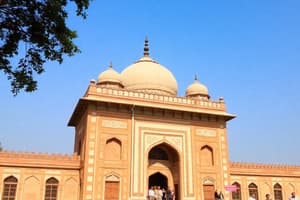Podcast
Questions and Answers
What percentage of the Indian population lived in villages during the sixteenth and seventeenth centuries?
What percentage of the Indian population lived in villages during the sixteenth and seventeenth centuries?
- About 85% (correct)
- About 90%
- About 50%
- About 60%
What was the main source of income for the Mughal state during the sixteenth and seventeenth centuries?
What was the main source of income for the Mughal state during the sixteenth and seventeenth centuries?
- Mining and resource extraction
- Agricultural production (correct)
- Taxation of urban areas
- Trade with other empires
Which group sought to control rural society to ensure regular tax collection for the Mughal state?
Which group sought to control rural society to ensure regular tax collection for the Mughal state?
- Foreign traders
- Religious leaders
- Agents of the Mughal state (correct)
- Peasants' unions
What was the basic unit of agricultural society during the sixteenth and seventeenth centuries in India?
What was the basic unit of agricultural society during the sixteenth and seventeenth centuries in India?
What linked the agricultural areas with the towns during the sixteenth and seventeenth centuries in India?
What linked the agricultural areas with the towns during the sixteenth and seventeenth centuries in India?
Study Notes
Demographics and Economy in Mughal India
- Around 80% of the Indian population lived in villages during the 16th and 17th centuries.
Mughal State Revenue
- The main source of income for the Mughal state during the 16th and 17th centuries was land revenue.
Rural Society and Tax Collection
- The Zamindars, a group of local chieftains, sought to control rural society to ensure regular tax collection for the Mughal state.
Agricultural Society
- The basic unit of agricultural society during the 16th and 17th centuries in India was the village.
Trade and Commerce
- The rural areas were linked to the towns through a network of merchants and traders who transported goods and services during the 16th and 17th centuries in India.
Studying That Suits You
Use AI to generate personalized quizzes and flashcards to suit your learning preferences.
Description
Test your knowledge of Indian history with a quiz focusing on the themes of peasants, zamindars, and the Mughal Empire during the sixteenth and seventeenth centuries. Explore the dynamics of agrarian society and the roles of different social groups in rural India.



